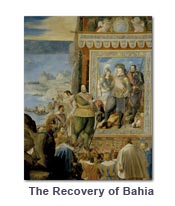Date/Time
Friday, February 11, 2011–Saturday, February 12, 2011
All Day
Location
UCLA William Andrews Clark Memorial Library
2520 Cimarron Street
—a conference organized by Susana Hernández Araico, Cal Poly Pomona

Under the rule of three Hapsburg kings in the seventeenth-century, Spanish society sees the boom of a dramatic tradition that had been centuries in the making, particularly within the economic and scientific framework of the Renaissance. In seventeenth-century Spain theater productions are staged mainly in four venues: public playhouses known as corrales, royal and noble palaces, Jesuit schools, and public plazas with carted stages preceded by multiethnic dance processions. This theatrical network in Spain branches out to the American viceroyalties of New Spain (stretching as far east as the Philippines) and Perú. All of these types of theater are very closely interrelated and cannot be accurately studied in isolation. This multifaceted economy of public entertainment in Imperial Spain, invariably encompassing controversial issues of race, gender, and other current sociopolitical conflicts, forms part of a Pan-European obsession with the spectacle of power and the visual display of creative imagination. The seventeenth-century Spanish theatrical boom is also intricately enmeshed with a nationalistic assertion of dominant cultural values that imply both reverence and resentment of the monarchy and the nobility that simultaneously props it up and debilitates it. More and more throughout the seventeenth century, the spectacle of theater denotes a visual fascination with the hollowness of appearances while a representation of a general consciousness of the decline of the Hapsburg monarchy gains preeminence.
Program
Session 1
Chair: Sherry Velasco, University of Southern California
George Peale, California State University, Fullerton
“Court Theater and Pageantry in the Reign of Philip III: The Light and Shadow of Lerma Onstage”
Edward H. Friedman, Vanderbilt University
“Early Modern Spanish Drama: Making and Breaking the Rules”
Frederick A. de Armas, University of Chicago
“Palermo’s Pagan Paintings: The Colonizing Riches of Lope de Vega’s El anzuelo de Fenisa”
Session 2
Chair: Jorge Checa, University of California, Santa Barbara
Ignacio Arellano, Universidad de Navarra, Spain
“The Faces of Power in the Allegorical Plays of Calderón”
Margaret R. Greer, Duke University
“Echos and Reflections of Power: Calderón’s Eco y Narciso and Velázquez’ Las Meninas”
Session 3
Chair: Sara Poot Herrera, University of California, Santa Barbara
Julio Alonso Asenjo, Universitat de València, Spain
“Musical Theater in Hispanic Student Celebrations: El sacro nombre de Augusto (Seville, 1749)”
Louise K. Stein, University of Michigan
“The Power of Performance: Opera, Singers, and Patrons in Madrid and Naples”
Alejandro González Puche, Universidad del Valle, Colombia
“Interpretative Games for Directing Spanish Golden Age / Early Modern Theater”
Theater performance
Scenes from the Bilingual Foundation of the Arts’ forthcoming production of Calderón’s La vida es sueño, under the direction of Denise Blasor

